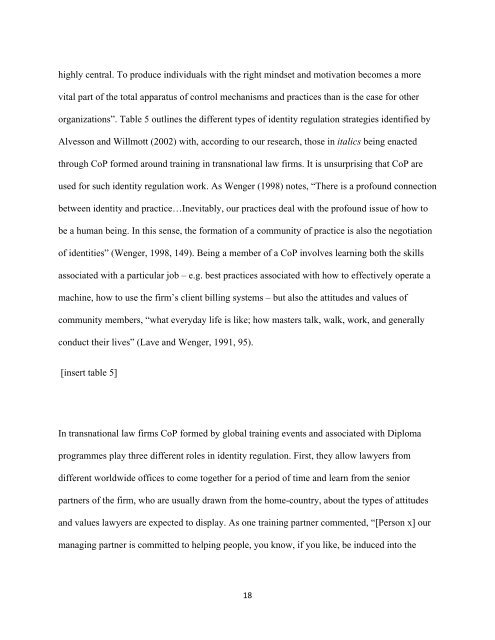Learning to be a lawyer in transnational law firms: communities of ...
Learning to be a lawyer in transnational law firms: communities of ...
Learning to be a lawyer in transnational law firms: communities of ...
You also want an ePaper? Increase the reach of your titles
YUMPU automatically turns print PDFs into web optimized ePapers that Google loves.
highly central. To produce <strong>in</strong>dividuals with the right m<strong>in</strong>dset and motivation <strong>be</strong>comes a more<br />
vital part <strong>of</strong> the <strong>to</strong>tal apparatus <strong>of</strong> control mechanisms and practices than is the case for other<br />
organizations”. Table 5 outl<strong>in</strong>es the different types <strong>of</strong> identity regulation strategies identified by<br />
Alvesson and Willmott (2002) with, accord<strong>in</strong>g <strong>to</strong> our research, those <strong>in</strong> italics <strong>be</strong><strong>in</strong>g enacted<br />
through CoP formed around tra<strong>in</strong><strong>in</strong>g <strong>in</strong> <strong>transnational</strong> <strong>law</strong> <strong>firms</strong>. It is unsurpris<strong>in</strong>g that CoP are<br />
used for such identity regulation work. As Wenger (1998) notes, “There is a pr<strong>of</strong>ound connection<br />
<strong>be</strong>tween identity and practice…Inevitably, our practices deal with the pr<strong>of</strong>ound issue <strong>of</strong> how <strong>to</strong><br />
<strong>be</strong> a human <strong>be</strong><strong>in</strong>g. In this sense, the formation <strong>of</strong> a community <strong>of</strong> practice is also the negotiation<br />
<strong>of</strong> identities” (Wenger, 1998, 149). Be<strong>in</strong>g a mem<strong>be</strong>r <strong>of</strong> a CoP <strong>in</strong>volves learn<strong>in</strong>g both the skills<br />
associated with a particular job – e.g. <strong>be</strong>st practices associated with how <strong>to</strong> effectively operate a<br />
mach<strong>in</strong>e, how <strong>to</strong> use the firm’s client bill<strong>in</strong>g systems – but also the attitudes and values <strong>of</strong><br />
community mem<strong>be</strong>rs, “what everyday life is like; how masters talk, walk, work, and generally<br />
conduct their lives” (Lave and Wenger, 1991, 95).<br />
[<strong>in</strong>sert table 5]<br />
In <strong>transnational</strong> <strong>law</strong> <strong>firms</strong> CoP formed by global tra<strong>in</strong><strong>in</strong>g events and associated with Diploma<br />
programmes play three different roles <strong>in</strong> identity regulation. First, they allow <strong><strong>law</strong>yer</strong>s from<br />
different worldwide <strong>of</strong>fices <strong>to</strong> come <strong>to</strong>gether for a period <strong>of</strong> time and learn from the senior<br />
partners <strong>of</strong> the firm, who are usually drawn from the home-country, about the types <strong>of</strong> attitudes<br />
and values <strong><strong>law</strong>yer</strong>s are expected <strong>to</strong> display. As one tra<strong>in</strong><strong>in</strong>g partner commented, “[Person x] our<br />
manag<strong>in</strong>g partner is committed <strong>to</strong> help<strong>in</strong>g people, you know, if you like, <strong>be</strong> <strong>in</strong>duced <strong>in</strong><strong>to</strong> the<br />
18
















